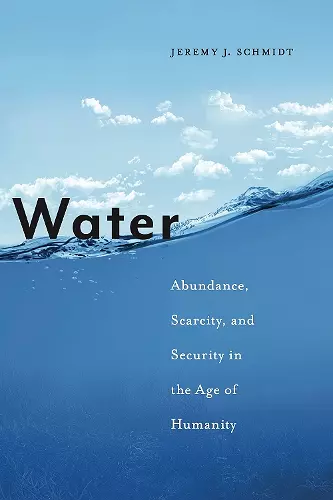Water
Abundance, Scarcity, and Security in the Age of Humanity
Format:Paperback
Publisher:New York University Press
Published:1st Apr '19
Should be back in stock very soon
This paperback is available in another edition too:
- Hardback£74.00(9781479846429)

An intellectual history of America's water management philosophy
Humans take more than their geological share of water, but they do not benefit from it equally. This imbalance has created an era of intense water scarcity that affects the security of individuals, states, and the global economy. For many, this brazen water grab and the social inequalities it produces reflect the lack of a coherent philosophy connecting people to the planet. Challenging this view, Jeremy Schmidt shows how water was made a “resource” that linked geology, politics, and culture to American institutions. Understanding the global spread and evolution of this philosophy is now key to addressing inequalities that exist on a geological scale.
Water: Abundance, Scarcity, and Security in the Age of Humanity details the remarkable intellectual history of America’s water management philosophy. It shows how this philosophy shaped early twentieth-century conservation in the United States, influenced American international development programs, and ultimately shaped programs of global governance that today connect water resources to the Earth system. Schmidt demonstrates how the ways we think about water reflect specific public and societal values, and illuminates the process by which the American approach to water management came to dominate the global conversation about water.
Debates over how human impacts on the planet are connected to a new geological epoch—the Anthropocene—tend to focus on either the social causes of environmental crises or scientific assessments of the Earth system. Schmidt shows how, when it comes to water, the two are one and the same. The very way we think about managing water resources validates putting ever more water to use for some human purposes at the expense of others.
Watermakes a strong and compelling case that we have accepted for far too long the perspective that water can be constructed only, or primarily, as a resource. * Environmental History *
[An] ambitious, deeply researched, and thoughtful work of interdisciplinary scholarship. . . establishes fascinating connections between seeming dead ends in American intellectual history and todays global socioenvironmental concerns. * Journal of American History *
I heartily recommend this book to anyone who is interested in the nexus between ideas and water, writ large. It is an impressive and incisive look into the minds of those who control a substance that is essential to all forms of life. * American Historical Review *
Wide-ranging and incisive . . . Drawing on diverse conceptual traditions, including anthropology, geography, geology, environmental history and political philosophy, Schmidt traces the co-evolution of water management and American liberalism. . . . I found Schmidts book to be challenging, stimulating and instructive, and I am sure it will quickly become core reading for anyone interested in water and society. * Water Alternatives *
In showing how water resources are far from a neutral category, this well researched and enlightening book is an important read for understanding how we perceive water today. * LSE Review of Books *
Using history and the connection between humanity and geology, this title offers readers a unique viewpoint on and an in-depth understanding of water management. * Choice *
This is an important book on an important subject. * Catholic Library World *
Rather than focusing on the mundane, mirco-level materials that shape water, Schmidt looks at the thoughts, values, and, most of all, the philosophy behind water management... Ultimately, Schmidt asks readers to rethink water’s role as a “neutral category” and realize this resource is used to reinforce broader ways of thinking and being in the world. -- Journal of Agricultural and Environmental Ethics
Humans both consume too much water and fail to benefit from it equitably. Geographer Jeremy Schmidt’s multidisciplinary study shows how historical US approaches to water management have gained global reach, leading to problematic biases. -- Nature
Jeremy Schmidt’s Water examines how these water worlds are conceived by anthropological theory. A bold and remarkable book, it offers a profound reassessment of central tenets within the anthropology of water… The book is an intellectual history, but it hews closer to science and technology studies than history of science in its philosophical concerns and theoretical ambition. It is required reading for anthropologists of water, as well as geographers, conservationists, and others interested in the management of water resources. -- PoLar Online
Water is a philosophy of water that intellectually challenges the reader on many levels. Its core chapters present a fresh history of ideas in the disciplines of geology, anthropology, and others that have shaped modern water thought in the U.S. and beyond, from the late-19th century culture of Washington DC civic scholars WJ McGee and J.W. Powell to the pragmatism of 20th century water management and 21st century global water agendas for the Anthropocene. It frames and critically challenges that account with perspectives from Wittgenstein and others as a liberal philosophy of water that has become so widespread as to become what Schmidt calls 'normal water.' His searching critique is not just about the philosophy of water, it contributes to that philosophy in its ideas and methods. -- James L. Wescoat, Jr. ,Aga Khan Professor, MIT
This sweeping, inter-disciplinary book is brilliant, refreshing and bold. It asks two fundamental questions in which we should all be interested: where have the ideas of water as a 'resource' to be 'managed' for the good of society or the nation come from? And how have they driven world-wide economic development that has not infrequently done more harm than good? The answers might surprise you (spoiler alert: anthropology and philosophy had a lot to do with the formation of this paradigm). This book is perhaps most imaginative in the ways it aims to disrupt a way of thinking that has dominated the anthropocene for far too long. -- Steven C. Caton,Professor of Anthropology, Harvard University
ISBN: 9781479853823
Dimensions: unknown
Weight: 408g
320 pages